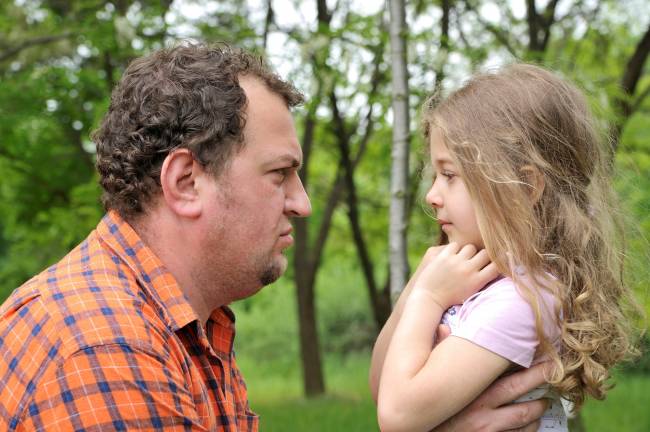Although times have changed since we were young, kids still need boundaries and to understand right from wrong. But what’s the best way to keep our kids on the straight and narrow? If we watch parenting programmes on TV, we’re given a bewildering range of advice. One parenting expert tells us to plonk misbehaving toddlers on a ‘naughty step’, another says that this tactic is actually harmful to their development… so what should we do?
SHOULD I EVER SMACK MY CHILD?
Although it’s easy to lose your temper and in the heat of the moment want to smack your child, it is not a good idea.
Remember that children learn by watching and copying you. This can carry on over into how they resolve problems with other children or adults as they get older, and even potentially later on with their own children or partners. Numerous studies show that children who are smacked are more likely to become aggressive themselves. By using other methods to discipline, you are actually demonstrating to your children some really valuable life skills in how to handle conflicts and disagreements, as well as setting clearly defined boundaries of acceptable behaviour.
It can also affect their relationship with you, causing them to fear you, withdraw from you, or even rebel. There are numerous ways of disciplining which do not have these kinds of emotional, never mind, physical repercussions.
HOW SHOULD I DISCIPLINE MY TODDLER?
Before your kids hit toddler-hood, there’s little point in disciplining them – they’re just too young to understand. But once they reach their second birthday (or even before) they will start testing boundaries as part of their natural desire to learn what happens when they do something. This is often called the ‘terrible twos’ but is just part of them learning more about their world and their affect on it. As they start testing boundaries, this is where you need to give them some direction about where those are.
First of all, don’t get in the habit of saying no! It’s all too easy to fall into, but remember that many of the things your children are trying are part of their learning. Do you need to say ‘no’ to something, or can you give them some flexibility? A key point to remember here is that if your child hears the word ‘no’ all the time, it has less meaning. If they want to get the pots and pans out of the kitchen cupboard and its safe for them to do so, or they want to pick up their food with their hands, let them do it and save the boundaries for where they are really needed.
Remember to also make sure that you do not only give your children attention when their behaviour is undesirable. It is common for parents to leave their children alone and get on with other things when they are playing nicely and quietly, and then only to wade in and get involved when we need to sort out an issue. This actually teaches children that the best way to get your attention is to act up! Remember to give your child LOTs of positive attention too, and make time to join in with then when they are playing nicely.
This doesn’t mean you have to ignore bad behaviour, but to just try and balance out if it is actually bad, and to make sure you remember to not ignore the good behaviour!
Another inevitable part of toddlerhood are the legendary tantrums. The legs-and-arms-kicking-floor-rolling-screaming-in-the-supermarket-tantrum.
While these are not fun, there are a few top tips to keep in mind:
- Toddlers like to know what is happening next, it is how they make sense of their word. If things do not happen as they are expecting, their immature emotional systems are not able to cope with the unexpected and it can lead to a tantum. It is just their way of releasing and communicating their difficult with the situation. In general, screaming back at them will not help them resolve their difficulty.
- Tantrums can happen when a child is trying and unable to communicate something, and they get frustrated. Again, screaming back at them will not help them, so calmly talk to them and see if you can help or distract them.
- Remember that a tantrum is an uncontrollable emotional outburst, and as such, it can be quite scary for the toddler experiencing it too. Screaming back at them will just scare them more, not help resolve it, so make sure you stay calm so that you can help them calm down too.
- Don’t ignore your child, and leave them on a ‘naughty step’ – they may need some time to calm down, but remembering that a tantrum is a sign that they are struggling to cope, it is not a good association to ignore/abandon them as they go through this. Just be with them while they calm down, so they know you are there.
- Remember that tantrums are normal and not a sign of how good a parent you are, or something to be embarrassed about. Every parent has experienced one at some point, over time you will learn ways to anticipate or avoid your own toddlers meltdown moments (it might be to always make sure you have a particular bowl and spoon for breakfast for example!) and how to help your child through when they do occur. It is a phase which will pass.

WHAT ABOUT SCHOOL-AGE KIDS?
Having established positive discipline with your toddler, once they are older it’s more of the same. The biggest difference is that now they are at an age where you can have proper conversations and explain the why’s behind some of the boundaries, so they understand that they are not just arbitrary or you trying to control every aspect of their lives.
You can also establish sanctions for boundary breaking if you wish, or even better, work together as a family to set some ‘house rules’ and mutually agreed consequences if they are broken, which all members of the family sign up to.
As they do become more independent, it is crucial to continue with the basic principles you started when they were toddlers, about focusing on which boundaries are really important, and not being critical over everything so that they stop listening. Whether they make their bed every morning or get their new shoes scuffed doesn’t really matter, but it does matter if they don’t come home straight from school, or they get into a car with a stranger. Give your children a bit of slack on the lesser issues so that when you talk to them about important boundaries, they do listen and remember them.
AND TEENAGERS?
Once kids hit puberty, it can all change again. You might have times where you feel like you just don’t recognise your child anymore! They might start to demonstrate behaviour which you are not at all happy with, shouting back at you or other family members, staying out late, drinking, etc. Many parents report finding this the most difficult part, parenting children who are now almost adults.
Even with your teenage children, continue with the steps you have had in place since they were toddlers.
- Keep calm as screaming and shouting at them is only likely to lead to them responding in the same way, or ignoring you entirely – neither are any good for establishing communication.
- Remember to keep praising the good, don’t just give them attention when they have done something you are not happy about.
- Talk to them. Explain your point of view and take time to hear theirs. See if you can reach a compromise and work together to find a middle ground which works for all of you. If your teenager feels listened to and respected, they are more likely to also listen to and respect you.
WHAT IF I’M SEPARATED FROM THEM?
This advice is all well and good, but what if you’re separated from your kids and only have every other weekend to work on discipline? What if your ex lets them get away with murder, but expects you to lay down the law in the brief, precious time you have with them?
For starters, remember that those two days with you will be incredibly precious to your kids too – don’t ruin them by being too heavy-handed.
If you can, agree a set of rules with your ex that apply to both homes. If not, work with your children to have a set of house rules for your home, and make it clear to your kids that anyone breaking those rules – including the adults – can be pulled up by anybody else. This includes you, which makes it seem much fairer and gives everyone an incentive to obey the rules.








